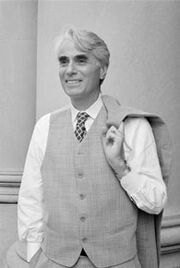Assessment |
Biopsychology |
Comparative |
Cognitive |
Developmental |
Language |
Individual differences |
Personality |
Philosophy |
Social |
Methods |
Statistics |
Clinical |
Educational |
Industrial |
Professional items |
World psychology |
Philosophy Index: Aesthetics · Epistemology · Ethics · Logic · Metaphysics · Consciousness · Philosophy of Language · Philosophy of Mind · Philosophy of Science · Social and Political philosophy · Philosophies · Philosophers · List of lists

| Part of the Politics series on Libertarianism |
|
Factions Influences Ideas Key issues |
| Politics Portal · edit |
Robert Nozick (November 16, 1938 – January 23, 2002) was an American philosopher and Pellegrino University Professor at Harvard University. Nozick, schooled at Columbia, Oxford and Princeton, was a prominent American political philosopher in the 1970s and 1980s. He did additional but less influential work in such subjects as decision theory and epistemology. His Anarchy, State, and Utopia (1974) was a libertarian answer to John Rawls' A Theory of Justice, published in 1971. He was born in Brooklyn, the son of a Jewish entrepreneur from Russia. He was married to the American poet Gjertrud Schnackenberg. Nozick died in 2002 after a prolonged struggle with cancer.
Philosophical achievements[]
Nozick's Anarchy, State, and Utopia, which garnered a National Book Award the following year, argues among other things, that a distribution of goods is just, so long as the distribution was brought about by free exchanges by consenting adults and was made from a just starting position, even if large inequalities emerge from the process. Nozick appealed to the Kantian idea that people should be treated as ends (what he termed 'separateness of persons'), not merely as a means. For example, forced redistribution of income treated people as if they were merely sources of money. Nozick here challenges John Rawls's arguments in A Theory of Justice that conclude that just inequalities in distribution must benefit the least well off. Nozick himself recanted the libertarian views he had earlier expressed in Anarchy, State, and Utopia in one of his later books, The Examined Life, calling those views "seriously inadequate." In a 2001 interview, however, he clarified his position: "What I was really saying in The Examined Life was that I was no longer as hardcore a libertarian as I had been before. But the rumors of my deviation (or apostasy!) from libertarianism were much exaggerated." [1]
- In Philosophical Explanations (1981), which received the Phi Beta Kappa Society's Waldo Emerson Award, Nozick provides novel accounts of knowledge, free will, personal identity, the nature of value, and the meaning of life. He also put forward an epistemological system which attempted to deal with both Edmund Gettier-style problems and those posed by scepticism. This highly influential argument eschewed justification as a necessary requirement for knowledge.
- The Examined Life (1989), pitched to a broader public, explores love, death, faith, reality, and the meaning of life. The Nature of Rationality (1993) presents a theory of practical reason that attempts to embellish notoriously spartan classical decision theory.
- Socratic Puzzles (1997) is a collection of papers that range in topic from Ayn Rand and Austrian economics to animal rights, while his last production,
- Invariances (2001) applies insights from physics and biology to questions of objectivity in such areas as the nature of necessity and moral value.
Nozick was notable for his curious, exploratory style and methodological ecumenism. Often content to raise tantalizing philosophical possibilities and then leave judgment to the reader, Nozick was also notable for inventively drawing from literature outside of philosophy (e.g., economics, physics, evolutionary biology) to infuse his work with freshness and relevance.
Writings[]
- Invariances: The Structure of the Objective World (2001/2003) ISBN 0-674-01245-3
- Socratic Puzzles (1997) ISBN 0-674-81653-6
- The Nature of Rationality (1993/1995) ISBN 0-691-02096-5
- The Examined Life (1989) ISBN 0-671-72501-7
- Philosophical Explanations (1981) ISBN 0-19-824672-2
- Anarchy, State, and Utopia (1974/2001) ISBN 0-631-19780-X
See also[]
References[]
- Nozick, Robert (1974). Anarchy, State, and Utopia. Basic Books.
- Robinson, Dave & Groves, Judy (2003). Introducing Political Philosophy. Icon Books. ISBN 1-84046-450-X.
External links[]
- Obituary by The Daily Telegraph
- Obituary by The Guardian
- Obituary by The Independent
- Philosopher Nozick dies at 63 From the Harvard Gazette
- Robert Nozick Memorial minute
- Robert Nozick (1938-2002) by Edward Feser
- A summary of the political philosophy of Robert Nozick by R. N. Johnson
- Robert Nozick, Libertarianism, And Utopia by Jonathan Wolff
- Nozick on Newcomb's Problem and Prisoners' Dilemma by S. L. Hurley
- Robert Nozick: Against Distributive Justice by R.J. Kilcullen
- Why Do Intellectuals Oppose Capitalism? by Robert Nozick
- Open Directory Project - Robert Nozick directory category
- Robert Nozick, Philosopher of Liberty by Roderick T. Long
| This page uses Creative Commons Licensed content from Wikipedia (view authors). |
